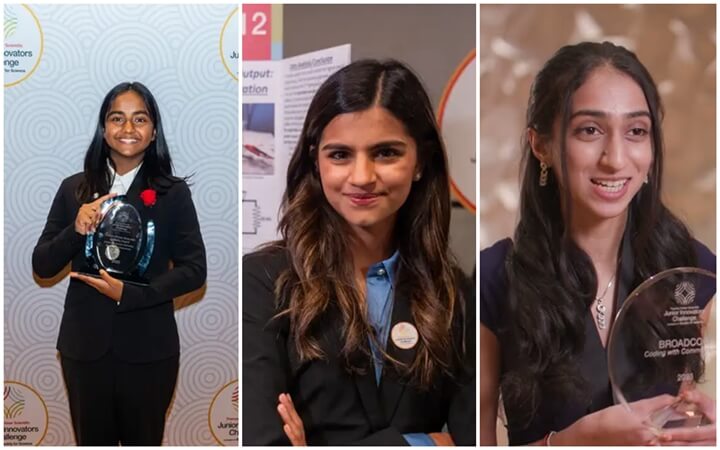Today’s Indian-origin kids of immigrants and non-immigrants are the future of America. Through every STEM competition, they testify to their collective talent for the future growth and prosperity of the United States where they are nurtured as innovators, researchers, and scientists. Be it Regeneron Science Talent Search or Thermo Fisher Scientific Junior Innovators Challenge, young Indian American minds continue to shine.
The Thermo Fisher Scientific Junior Innovators Challenge (JIC), America’s only middle school STEM competition affiliated to Society for Science, saw the best of 30 finalists who were selected out of the 10% of 65,000 middle-schoolers through several science and engineering fairs across the country. While 16 Indian American kids made it to the list of finalists at the Thermo Fisher Scientific Junior Innovators Challenge 2023, four of them including Shanya Gill made the cut as winners. The winners are counted among America’s brightest middle schoolers.

PC: Society for Science | Shanya Gill, Maya Gandhi, Keshvee Sekhda (from left to right)
Shanya Gill from California wins $25,000 ASCEND Award
A sixth grader from Stratford School, Shanya Gill won the first prize – the Thermo Fisher Scientific ASCEND (Aspiring Scientists Cultivating Exciting New Discoveries) award – and bagged $25,000 for her fire detection system. She developed an early fire detection system consisting of a wall-mounted thermal camera and a Raspberry Pi (a small single-board computer). It uses thermal imaging to detect unattended fires and triggers text alerts when a heat source is left unattended for more than 10 minutes.
Unlike conventional smoke detectors that send delayed alerts (usually after fire rapidly spreads and emits large quantities of smoke), Shanya Gill’s early fire detection system warns of a house fire at an initial stage, thus facilitating a rapid emergency action to save lives, prevent casualties, and avert property damage. Her prototype fire detection system has shown promising results and is accurate 97% of the time. Shanya aspires to become a biomedical engineer and hopes to make a difference in this world by combining her ‘love for biology’ and ‘passion for innovation’.
Shanya Gill of San Jose felt the need for a more efficient, accurate and affordable fire alarm system when a fire accident reduced a restaurant near her home to ashes in 2022. She started working on her idea of employing thermal cameras for early fire detection. She connected the thermal cameras to a tiny computer and programmed it in such a way that it identifies people as warm, moving objects and heat sources like gas burners as hot, static objects. During the trials, her device accurately detected humans 98% of the time and heat sources 97% of the time.
Not only her research project, but her leadership, collaboration and critical thinking skills impressed the panel of judges during the Finals Week challenge.
Other Indian American Winners at Thermo Fisher JIC Challenge 2023
14-year-old Keshvee Sekhda from Georgia bagged the $10,000 Broadcom Coding with Commitment Award for her early cancer diagnosis that demonstrates her commitment to improving community well-being. A resident of Sugar Hill, a suburb of Atlanta; she developed the smartphone app IdentiCan with her teammate Nyambura Sallinen to help people identify the likelihood of having lung, skin and breast cancer. They fed a machine learning algorithm with data in the form of photos, health scan images and audio clips for effective diagnosis. They are now looking to collaborate with doctors for further improvement of the app.
8th grader Maya Gandhi from Anaheim, California won the $10,000 DoD STEM Talent Award for her research on optimizing energy output of plant microbial fuel cells, at the Thermo Fisher Scientific Junior Innovators Challenge. Driven by her profound interest in sustainable energy sources, her research is aimed at minimizing the world’s dependence on fossil fuels that account for more than 90% of harmful carbon emissions. Maya Gandhi experimented using different substances for anode in plant microbial fuel cells that generate sustainable energy from living plants and microbes in the soil.
13-year-old Adyant Bhavsar from San Jose, California, received the $10,000 Lemelson Award for Invention. An avid environmentalist, Adyant created an affordable and eco-friendly version of a triboelectric nanogenerator to support sustainable energy supply to disaster monitoring systems installed at wildfire-prone areas throughout California. This device converts mechanical energy generated by two touching/sliding objects into electrical energy. Apart from science and sustainability, he’s into writing, speech and debate. The 7th grader is also a published author with two fictional storybooks to his credit.





